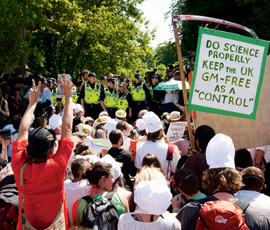Review of 2012: GM wheat trial sparks controversy

As we bid farewell to 2012 we look back at the events the marked last year such as the Rothamsted wheat trial that sparked protests from anti-GM campaigners
Scientists developing genetically modified (GM) wheat successfully completed the first of a two-year open field experiment – despite threats to sabotage the crop by protesters.
The £1m trial at Rothamsted Research in Harpenden, Hertfordshire, aims to see whether GM wheat can deter aphids – a major crop pest that cause an estimated £100m of damage each year in the UK alone.
The GM wheat emits a naturally occurring chemical found in peppermint, called E-beta-farnesene, which repels aphids and also attracts their natural predators, such as parasitic wasps and ladybirds, removing the need for pesticides.
The protest group Take the Flour Back had vowed to “decontaminate” the area unless the research was halted. But police thwarted an attempt by 200 protesters to storm the site in May.
In a separate incident, anti-GM protester Hector Christie, 51, of Instow, north Devon, caused “significant” damage to the crop after a break-in at the site in May. He was fined nearly £4,000 after admitting criminal damage.
